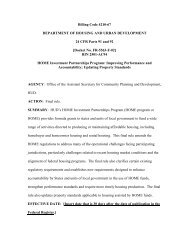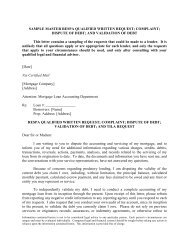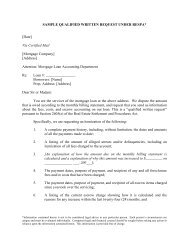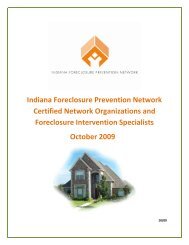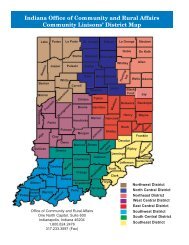17 - Indiana Association for Community Economic Development
17 - Indiana Association for Community Economic Development
17 - Indiana Association for Community Economic Development
You also want an ePaper? Increase the reach of your titles
YUMPU automatically turns print PDFs into web optimized ePapers that Google loves.
<strong>Indiana</strong>’s mounting rate of <strong>for</strong>eclosure, it seems more critical now than ever thateach prospective homebuyer makes the right choice <strong>for</strong> themselves and theirfamilies. For some households, homeownership may not be the most sensible orfeasible option. Funders who are interested in outcome-based results should have aclear understanding that an individual who makes an in<strong>for</strong>med decision not to buy ahome can represent as much of a success as one who does achievehomeownership. The financial education and other counseling services that theseindividuals receive from homebuyer education agencies is itself a valuable service,and one that should continue to be funded at an appropriate level.3. Open the door to post-purchase counseling. While pre-purchase counseling is avaluable tool to help homebuyers make wise decisions throughout the purchaseprocess, practitioners have indicated that post-purchase counseling is perhaps evenmore critical to helping families not only attain homeownership, but maintainhomeownership over the long term. The challenge, however, lies in 1) covering thecost of post-purchase counseling and 2) getting clients to return after their homepurchase <strong>for</strong> additional counseling sessions. Funders could assist in this process by:A. Requiring post-purchase counseling in order <strong>for</strong> prospective homebuyers toqualify <strong>for</strong> low-rate loan products, downpayment assistance programs, and otherspecialized services.13B. Facilitating and/or incentivizing improved communications betweenlenders and homeownership education providers, so that educators canintervene with clients as soon as a problem occurs, rather than waiting until theclient approaches them (often, this does not occur until the client has receivednotice of <strong>for</strong>eclosure, when it may be too late to avoid the <strong>for</strong>eclosure process).Organizations who actually hold the loan <strong>for</strong> their clients have had substantialsuccess in averting potential default/<strong>for</strong>eclosure situations, simply because theyare aware early on if the client begins to experience difficulty making payments.4. Develop mechanisms to support and sustain interaction, communication, andcooperation among homeownership education and counseling providers andother stakeholders. The concept of a regional network system, which wasdiscussed at length throughout the HomeEC Initiative, sparked strong reactions, withsupporters on both sides of the issue. Generally speaking, from region to region, theresponse varied greatly; within regions, however, there was relative consensus. Thediversity of opinions among regions indicates that any changes to <strong>Indiana</strong>’shomebuyer education system should allow the opportunity <strong>for</strong> a similar diversity ofsolutions to the regional-network question.A. Incentivize networks, rather than mandating them. Rather than a mandatory,highly <strong>for</strong>malized regional network system, we recommend first implementing anoptional, bona fide connection of services among providers, in a regional area tobe determined by the providers, by an oversight body, or both. Regionalcommittees made up of homebuyer education providers would drive and/or<strong>Indiana</strong>’s Homeownership Education & Counseling System (HomeEc) Report — XL



